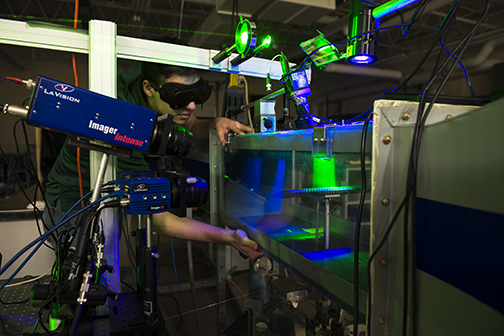Mechanical Engineering Major
The Mechanical Engineering program at NDSU is accredited by the Engineering Accreditation Commission of ABET (www.abet.org). The curriculum is designed to produce baccalaureate-level graduates who are well prepared to accept engineering positions in industry and government or to pursue advanced degree studies.
Mission
The Department of Mechanical Engineering at NDSU will contribute to the aspirations of a land-grant university in the three primary components of education, research, and service. In support of these endeavors the mission of the department is to:
- Educate undergraduate and graduate students in the fundamentals of the discipline, prepare graduates to effectively function in society in the field of their choice, and provide the learning skills to adapt to evolving personal and professional goals.
- Develop and maintain high quality research programs in traditional and emerging areas that build on the diverse strengths of the faculty, foster interdisciplinary collaborations, and address national and global needs.
- Serve the needs of the profession, the state of North Dakota, and regional industries to promote and enhance economic development opportunities.
Educational Objectives
Graduates of the Mechanical Engineering Program will:
- Provide valuable contributions to the engineering profession in the field of their choice.
- Adapt to emerging technologies through continued professional development.
- Uphold high ethical and professional standards in the practice of engineering.
- Effectively function in a team environment and interact with people of diverse backgrounds.
- Be engaged and conscientious practitioners who understand the context in which their designs are implemented and the corresponding impact of their activities on society.
A complete listing of the student outcomes associated with these objectives can be viewed on the department’s web site.
Strong program emphasis is placed on engineering science, laboratory, and design. The use of modern computer tools and techniques in engineering practice also is incorporated throughout the curriculum. In addition, liberal arts education is included to prepare graduates for becoming concerned and productive members of society.
Students transferring into mechanical engineering from other departments or institutions are encouraged to do so no later than the beginning of the junior year if they wish to complete the degree requirements within two academic years.
Graduate programs leading to Master of Science and Doctor of Philosophy degrees in Mechanical Engineering are offered by the department. For more complete details, see the Graduate Bulletin online.
Selective Admission
The Department of Mechanical Engineering has a selective admission policy. To be admitted to the basic program (freshman and sophomore level), freshman applicants must either rank in the top one-third of their high school graduating class or have received a score of 26 or higher in the math portion of the ACT (or a score of 590 or higher in the math portion of the SAT). Transfer students, whether from another university or from another department at NDSU, must have an institutional grade point average (GPA) of at least 2.80.
To enter the professional program (junior and senior level), students must complete the basic program with a minimum Engineering GPA of 2.80, a minimum Cumulative GPA of 2.50 and no grades below 'C' in any one of the core courses.
A minimum institutional GPA of 2.50 is required for graduation from Mechanical Engineering. No course grades less than 'C' are acceptable to fulfill a degree requirement.
Curriculum
All Mechanical Engineering majors choose a minimum of five technical elective courses. These courses cover a wide range of topics and students may tailor their choices to reflect their special interests in solid mechanics and design, thermal sciences, energy, materials and nanotechnology, controls and mechatronics, biomedical engineering, aerospace, automotive engineering, or other areas as added in the future. For a complete list of technical electives available in each area, students should consult with their adviser, the department, or the curriculum guide.
Plan of Study
IMPORTANT DISCLAIMER: This guide is not an official curriculum. This guide is a sample four-year degree plan of how students might plan this major with other degree requirements to complete their education in four years.Student plans will vary from this sample due to a variety of factors, such as, but not limited to, start year, education goals, transfer credit, and course availability. To ensure proper degree completion, enrolled students should utilize Degree Map and Schedule Planner in Campus Connection and consult regularly with academic advisors to ensure graduation requirements are being met.
Degree Notes:
- Total degree credits required to graduate: 129*
- *Total credits listed above may exceed minimum credit requirements for graduation.

